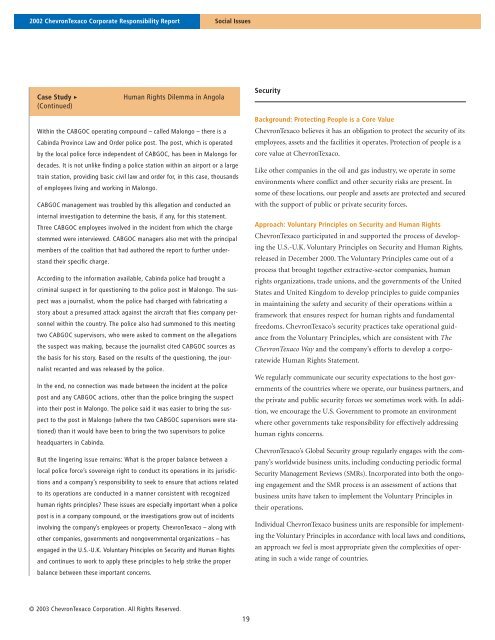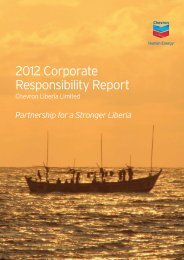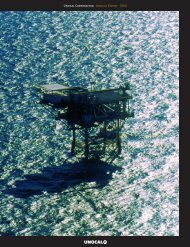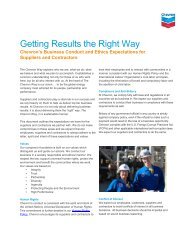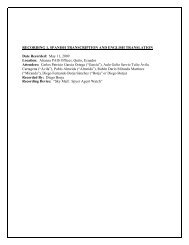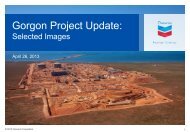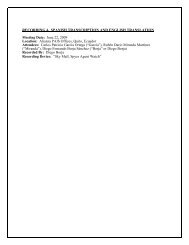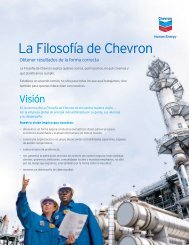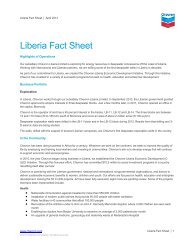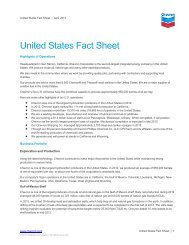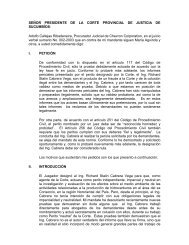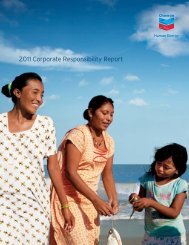Download PDF - Chevron
Download PDF - Chevron
Download PDF - Chevron
Create successful ePaper yourself
Turn your PDF publications into a flip-book with our unique Google optimized e-Paper software.
2002 <strong>Chevron</strong>Texaco Corporate Responsibility Report Social IssuesCase Study >Human Rights Dilemma in Angola(Continued)Within the CABGOC operating compound – called Malongo – there is aCabinda Province Law and Order police post. The post, which is operatedby the local police force independent of CABGOC, has been in Malongo fordecades. It is not unlike finding a police station within an airport or a largetrain station, providing basic civil law and order for, in this case, thousandsof employees living and working in Malongo.CABGOC management was troubled by this allegation and conducted aninternal investigation to determine the basis, if any, for this statement.Three CABGOC employees involved in the incident from which the chargestemmed were interviewed. CABGOC managers also met with the principalmembers of the coalition that had authored the report to further understandtheir specific charge.According to the information available, Cabinda police had brought acriminal suspect in for questioning to the police post in Malongo. The suspectwas a journalist, whom the police had charged with fabricating astory about a presumed attack against the aircraft that flies company personnelwithin the country. The police also had summoned to this meetingtwo CABGOC supervisors, who were asked to comment on the allegationsthe suspect was making, because the journalist cited CABGOC sources asthe basis for his story. Based on the results of the questioning, the journalistrecanted and was released by the police.In the end, no connection was made between the incident at the policepost and any CABGOC actions, other than the police bringing the suspectinto their post in Malongo. The police said it was easier to bring the suspectto the post in Malongo (where the two CABGOC supervisors were stationed)than it would have been to bring the two supervisors to policeheadquarters in Cabinda.But the lingering issue remains: What is the proper balance between alocal police force’s sovereign right to conduct its operations in its jurisdictionsand a company’s responsibility to seek to ensure that actions relatedto its operations are conducted in a manner consistent with recognizedhuman rights principles? These issues are especially important when a policepost is in a company compound, or the investigations grow out of incidentsinvolving the company’s employees or property. <strong>Chevron</strong>Texaco – along withother companies, governments and nongovernmental organizations – hasengaged in the U.S.-U.K. Voluntary Principles on Security and Human Rightsand continues to work to apply these principles to help strike the properbalance between these important concerns.SecurityBackground: Protecting People is a Core Value<strong>Chevron</strong>Texaco believes it has an obligation to protect the security of itsemployees, assets and the facilities it operates. Protection of people is acore value at <strong>Chevron</strong>Texaco.Like other companies in the oil and gas industry, we operate in someenvironments where conflict and other security risks are present. Insome of these locations, our people and assets are protected and securedwith the support of public or private security forces.Approach: Voluntary Principles on Security and Human Rights<strong>Chevron</strong>Texaco participated in and supported the process of developingthe U.S.-U.K. Voluntary Principles on Security and Human Rights,released in December 2000. The Voluntary Principles came out of aprocess that brought together extractive-sector companies, humanrights organizations, trade unions, and the governments of the UnitedStates and United Kingdom to develop principles to guide companiesin maintaining the safety and security of their operations within aframework that ensures respect for human rights and fundamentalfreedoms. <strong>Chevron</strong>Texaco’s security practices take operational guidancefrom the Voluntary Principles, which are consistent with The<strong>Chevron</strong>Texaco Way and the company’s efforts to develop a corporatewideHuman Rights Statement.We regularly communicate our security expectations to the host governmentsof the countries where we operate, our business partners, andthe private and public security forces we sometimes work with. In addition,we encourage the U.S. Government to promote an environmentwhere other governments take responsibility for effectively addressinghuman rights concerns.<strong>Chevron</strong>Texaco’s Global Security group regularly engages with the company’sworldwide business units, including conducting periodic formalSecurity Management Reviews (SMRs). Incorporated into both the ongoingengagement and the SMR process is an assessment of actions thatbusiness units have taken to implement the Voluntary Principles intheir operations.Individual <strong>Chevron</strong>Texaco business units are responsible for implementingthe Voluntary Principles in accordance with local laws and conditions,an approach we feel is most appropriate given the complexities of operatingin such a wide range of countries.© 2003 <strong>Chevron</strong>Texaco Corporation. All Rights Reserved.19


